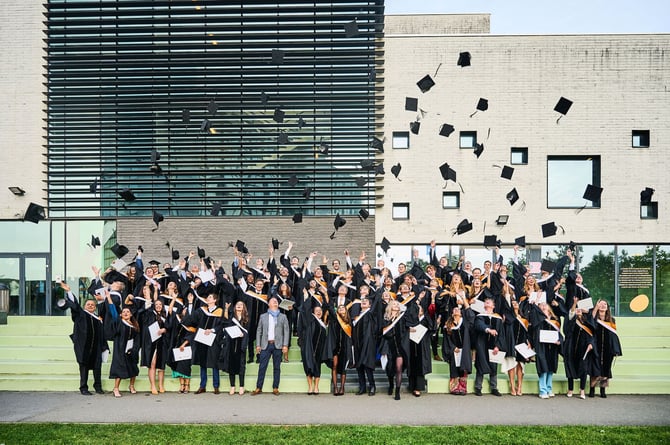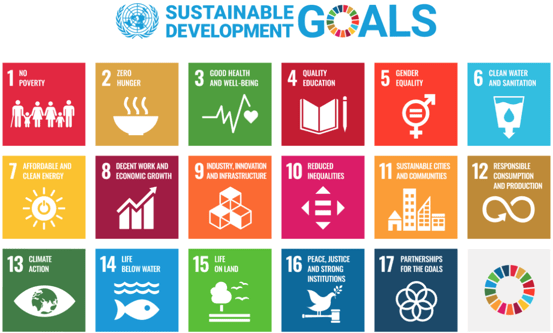Learn more about us.
Solvay Executive MBA
United Nations' SDG Scholarships
Solvay Brussels School offers numerous scholarships each year to promote diversity in the classroom, academic excellence and equal access to learning. Our SDG Scholarships reward change makers whose actions contribute to the UN Sustainable Development Goals (SDG).

Are you a change maker?
The Solvay Executive MBA proudly supports the United Nations Sustainable Development Goals (SDGs). These 17 goals address the global challenges we face, including poverty, inequality, climate change, environmental degradation, peace and justice - they are the blueprint to achieve a better and more sustainable future for all.
Prior to the start of the EMBA, applicants can apply for a scholarship. Later on in the programme, participants have to leverage their newly acquired skills and critically assess the sustainability policy of a real company within the framework of the Sustainability Project. This course is about using innovative ideas to generate sustainable change!

Eligibility
Our scholarships are based on the UN Sustainable Development Goals: applicants must have personally and/or professionally contributed to one or several target(s) with a proven track record of action(s). Discover the 17 scholarships available and their eligibility criteria.
Application
- The first step is to apply for the Solvay Executive MBA ;
- Once you have submitted your application, you can apply for the scholarship and choose your Sustainable Development Goal ;
- The EMBA Admission Committee will issue a joint decision regarding your EMBA and scholarship applications.
Financial Value
Our scholarships range from 2.500€ to 5.000€.
End poverty, in all its forms, everywhere.
- Eradicate extreme poverty
- Reduce poverty by at least 50%
- Implement nationally appropriate social protection systems
- Equal rights to ownership, basic services, technology, and economic resources
- Build resilience to environmental, economic, and social disasters
- Mobilisation of resources to end poverty
- Establishment of poverty eradication policy frameworks at all levels
End hunger, achieve food security and improve nutrition and promote sustainable agriculture.
- Universal access to safe and nutritious food
- End all forms of malnutrition
- Double the productivity and incomes of small-scale food producers
- Sustainable food production and resilient agricultural practices
- Maintain the genetic diversity in food production
- Invest in rural infrastructure, agricultural research, technology and gene banks
- Prevent agricultural trade restrictions, market distortions and export subsidies
- Ensure stable food commodity markets and timely access to information
Ensure healthy lives and promote well-being for all at all ages.
- Reduce maternal mortality
- End all preventable deaths under 5 years of age
- Fight communicable diseases
- Reduce mortality from non-communicable diseases and promote mental health
- Prevent and treat substance abuse
- Reduce road injuries and deaths
- Universal access to sexual and reproductive care, family planning and education
- Achieve universal health coverage
- Reduce illnesses and deaths from hazardous chemicals and pollution
Implement the WHO framework convention on tobacco control - Support research, development and universal access to affordable vaccines and medicines
- Increase health financing and support health workforce in developing countries
- Improve early warning systems for global health risks
Ensure inclusive and equitable quality education and promote lifelong learning opportunities for all.
- Free primary and secondary education
- Equal access to quality pre-primary education
- Equal access to affordable technical, vocational and higher education
- Increase the number of people with relevant skills for financial success
- Eliminate all discrimination in education
- Universal literacy and numeracy
- Education for sustainable development and global citizenship
- Build and upgrade inclusive and safe schools
- Expand higher education scholarships for developing countries
- Increase the supply of qualified teachers in developing countries
Achieve gender equality and empower all women and girls.
- End discrimination against women and girls
- End all violence against and exploitation of women and girls
- Eliminate forced marriages and genital mutilation
- Value unpaid care and promote shared domestic responsibilities
- Ensure full participation in leadership and decision-making
- Universal access to reproductive rights and health
- Equal rights to economic resources, property ownership and financial services
- Promote empowerment of women through technology
- Adopt and strengthen policies and enforceable legislation for gender equality
Ensure availability and sustainable management of water and sanitation for all.
- Safe and affordable drinking water
- End open defecation and provide access to sanitation and hygiene
- Improve water quality, wastewater treatment and safe reuse
- Increase water-use efficiency and ensure freshwater supplies
- Implement IWRM
- Protect and restore water-related ecosystems
- Expand water and sanitation support to developing countries
- Support local engagement in water and sanitation management
Ensure access to affordable, reliable, sustainable and modern energy for all.
- Universal access to modern energy
- Increase global percentage of renewable energy
- Double the improvement in energy efficiency
- Promote access to research, technology and investments in clean energy
- Expand and upgrade energy services for developing countries
Foster sustained, inclusive and sustainable economic growth, full and productive employment and decent work for all.
- Sustainable economic growth
- Diversify, innovate and upgrade for economic productivity
- Promote policies to support job creation and growing enterprises
- Improve resource efficiency in consumption and production.
- Full employment and decent work with equal pay
- Promote youth employment, education and training
- End modern slavery, trafficking, and child labour
- Protect labour rights and promote safe working environments
- Promote beneficial and sustainable tourism
- Universal access to banking, insurance and financial services
- Increase aid for trade support
- Develop a global youth employment strategy
Build resilient infrastructure, promote inclusive and sustainable industrialisation, and foster innovation.
- Develop sustainable, resilient and inclusive infrastructures
- Promote inclusive and sustainable industrialisation
- Increase access to financial services and markets
- Upgrade all industries and infrastructures for sustainability
- Enhance research and upgrade industrial technologies
- Facilitate sustainable infrastructure development for developing countries
- Support domestic technology development and industrial diversification
- Universal access to information and communications technology
Reduce inequality within and among countries.
- Reduce income inequalities
- Promote universal social, economic and political inclusion
- Ensure equal opportunities and end discrimination
- Adopt fiscal and social policies that promotes equality
- Improved regulation of global financial markets and institutions
- Enhanced representation for developing countries in financial institutions
- Responsible and well-managed migration policies
- Special and differential treatment for developing countries
- Encourage development assistance and investment in least developed countries
- Reduce transaction costs for migrant remittances
Make cities inclusive, safe, resilient and sustainable.
- Safe and affordable housing
- Affordable and sustainable transport systems
- Inclusive and sustainable urbanisation
- Protect the world's cultural and natural heritage
- Reduce the adverse effects of natural disasters
- Reduce the environmental impacts of cities
- Provide access to safe and inclusive green and public spaces
- Strong national and regional development planning
- Implement policies for inclusion, resource efficiency and disaster risk reduction
- Support least developed countries in sustainable and resilient building
To ensure sustainable consumption and production patterns.
- Implement the 10-year sustainable consumption and production framework
- Sustainable management and use of natural resources
- Halve global per capita food waste
- Responsible management of chemicals and waste
- Substantially reduce waste generation
- Encourage companies to adopt sustainable practices and sustainability reporting
- Promote sustainable public procurement practices
- Promote universal understanding of sustainable lifestyles
- 2Support developing countries' scientific and technological capacity for sustainable consumption and production
- Develop and implement tools to monitor sustainable tourism
- Remove market distortions that encourage wasteful consumption
Take urgent action to combat climate change and its impacts.
- Strengthen resilience and adaptive capacity to climate-related disasters
- Integrate climate change measures into policy and planning
- Build knowledge and capacity to meet climate change
- Implement the UN Framework Convention on Climate Change
- Promote mechanisms to raise capacity for planning and management
Conserve and sustainably use the oceans, seas and marine resources for sustainable development.
- Reduce marine pollution
- Protect and restore ecosystems
- Reduce ocean acidification
- Sustainable fishing
- Conserve coastal and marine areas
- End subsidies contributing to overfishing
- Increase the economic benefits from sustainable use of marine resources
- Increase scientific knowledge, research and technology for ocean health
- Support small scale fishers
- Implement and enforce international sea law
Protect, restore and promote sustainable use of terrestrial ecosystems, sustainably manage forests, combat desertification, and halt and reverse land degradation and halt biodiversity loss.
- Conserve and restore terrestrial and freshwater ecosystems
- End deforestation and restore degraded forests
- End desertification and restore degraded land
- Ensure conservation of mountain ecosystems
- Protect biodiversity and natural habitats
- Protect access to genetic resources and fair sharing of the benefits
- Eliminate poaching and trafficking of protected species
- Prevent invasive alien species on land and in water ecosystems
- Integrate ecosystem and biodiversity in governmental planning
- Increase financial resources to conserve and sustainably use ecosystem and biodiversity
- Finance and incentivise sustainable forest management
- Combat global poaching and trafficking
- Protect the forest from the nature
Promote peaceful and inclusive societies for sustainable development, provide access to justice for all and build effective, accountable and inclusive institutions at all levels.
- Reduce violence everywhere
- Protect children from abuse, exploitation, trafficking and violence
- Promote the rule of law and ensure equal access to justice
- Combat organised crime and illicit financial and arms flows
- Substantially reduce corruption and bribery
- Develop effective, accountable and transparent institutions
- Ensure responsive, inclusive and representative decision-making
- Strengthen the participation in global governance
- Provide universal legal identity
- Ensure public access to information and protect fundamental freedoms
- Strengthen national institutions to prevent violence and combat crime and terrorism
- Promote and enforce non-discriminatory laws and policies
Strengthen the means of implementation and revitalise the global partnership for sustainable development.
- Mobilise resources to improve domestic revenue collection
- Implement all development assistance commitments
- Mobilise financial resources for developing countries
- Assist developing countries in attaining debt sustainability
- Invest in least-developed countries
- Knowledge sharing and cooperation for access to science, technology and innovation
- Promote sustainable technologies to developing countries
- Strengthen the science, technology and innovation capacity for least-developed countries
- Enhanced SDG capacity in developing countries
- Promote a universal trading system under the WTO
- Increase the exports of developing countries
- Remove trade barriers for least-developed countries
- Enhance global macroeconomic stability
- Enhance policy coherence for sustainable development
- Respect national leadership to implement policies for the sustainable development goals
- Enhance the global partnership for sustainable development
- Encourage effective partnerships
- Enhance availability of reliable data
- Further develop measurements of progress